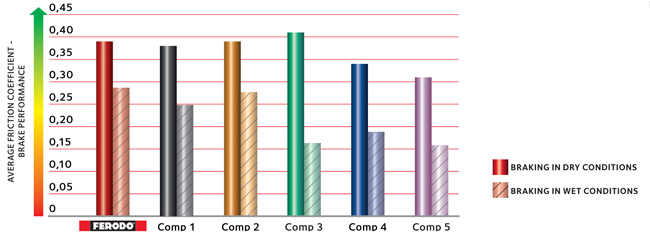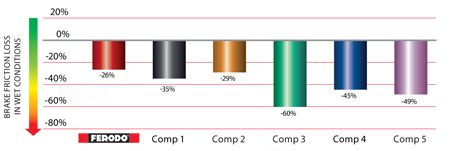Whether you are driving on the motorway, a secondary road or in the city center, traffic inevitably becomes more dangerous when it’s raining. Even the safest driver can encounter problems on the road in wet conditions, and all brakes are less effective in wet weather, with the additional problem of roads being more slippery.
While in such conditions a cautious driving style is recommended, of critical importance is having good quality brakes which perform consistently and effectively in wet conditions. The last thing you want is a nasty surprise when hitting the brake pedal.
The reality is that in changing road conditions, the friction material used in your brake pads is critical. The friction material determines the stopping power of your brake system, but the quality of that material can ensure that changing conditions don’t result in vastly changed performance.
R90 TESTS ARE ONLY CONDUCTED ON DRY CONDITIONS
European legislation stipulates that all brake pads sold for use on vehicles must be tested, and comply to R90 standards. The R90 test includes cold and hot brake friction analysis and if a brake pad has been R90 approved, it can be safely assumed that the product is within 15% of the original equipment product performance.
Because the R90 test is only conducted in dry braking conditions we decided to benchmark Ferodo brake pads against some competitor pads in wet braking conditions. Between the tested materials it’s easy to see that Ferodo offers brake pads with the lowest reduction of friction level in wet conditions.
THE WET BRAKING PERFORMANCE TEST
The test comparing the reduction of friction performance in wet braking conditions between Ferodo pads and competitor pads was conducted on a Ford C-Max. Six brake applications in dry conditions were measured, after which the brakes were sprayed in water for another 6 wet brake applications. To be sure that all the tests are conducted with equivalent and consistent brake pads, all brakes were bedded in first using identical procedures on new discs.

The graph above shows you the percentage of friction level reduction – or brake performance – between braking in dry and wet conditions, with Ferodo showing the lowest reduction from dry to wet compared to some competitors.

THE RESULTS
As the chart shows, Ferodo brake pads have the most consistent reduction of brake performance under wet braking conditions when compared to the competition. Previously conducted tests have already shown that Ferodo provides short stopping distances, low brake noise and great pedal feel. We can now proudly add that we have some of the best wet braking performance - proving again that with Ferodo you’re in control.
TEST PARAMETERS
- Brakes fully bedded-in through a cycle of 60 brake applications.
- Dry coefficient of friction is determined by taking the average of 6 brake applications from 80 to 30 km/h (50 to 19 mph).
- Wet conditioning is achieved by spraying the brake system for 10 minutes with water at a speed of 30 km/h (19 mph).
- Wet coefficient of friction is determined by taking the average of 6 brake applications from 80 to 30 km/h (50 to 19 mph).
- Vehicle: Ford C-Max, at a gross vehicle weight (GVW) of 1990 kg (2 Tons).
Competitor testing conducted in Europe between 2010 and 2014 following European industry standards by Federal-Mogul at its European Research and Development test facilities.